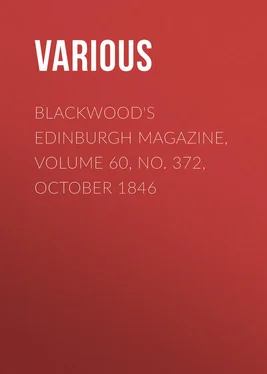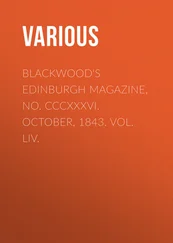Various - Blackwood's Edinburgh Magazine, Volume 60, No. 372, October 1846
Здесь есть возможность читать онлайн «Various - Blackwood's Edinburgh Magazine, Volume 60, No. 372, October 1846» — ознакомительный отрывок электронной книги совершенно бесплатно, а после прочтения отрывка купить полную версию. В некоторых случаях можно слушать аудио, скачать через торрент в формате fb2 и присутствует краткое содержание. Издательство: Иностранный паблик, Жанр: periodic, foreign_edu, Путешествия и география, на английском языке. Описание произведения, (предисловие) а так же отзывы посетителей доступны на портале библиотеки ЛибКат.
- Название:Blackwood's Edinburgh Magazine, Volume 60, No. 372, October 1846
- Автор:
- Издательство:Иностранный паблик
- Жанр:
- Год:неизвестен
- ISBN:нет данных
- Рейтинг книги:3 / 5. Голосов: 1
-
Избранное:Добавить в избранное
- Отзывы:
-
Ваша оценка:
- 60
- 1
- 2
- 3
- 4
- 5
Blackwood's Edinburgh Magazine, Volume 60, No. 372, October 1846: краткое содержание, описание и аннотация
Предлагаем к чтению аннотацию, описание, краткое содержание или предисловие (зависит от того, что написал сам автор книги «Blackwood's Edinburgh Magazine, Volume 60, No. 372, October 1846»). Если вы не нашли необходимую информацию о книге — напишите в комментариях, мы постараемся отыскать её.
Blackwood's Edinburgh Magazine, Volume 60, No. 372, October 1846 — читать онлайн ознакомительный отрывок
Ниже представлен текст книги, разбитый по страницам. Система сохранения места последней прочитанной страницы, позволяет с удобством читать онлайн бесплатно книгу «Blackwood's Edinburgh Magazine, Volume 60, No. 372, October 1846», без необходимости каждый раз заново искать на чём Вы остановились. Поставьте закладку, и сможете в любой момент перейти на страницу, на которой закончили чтение.
Интервал:
Закладка:
"I have lived for several years in the northern counties of Scotland, and during the last four or five in the province of Moray, a part of the country peculiarly adapted for collecting facts in Natural History, and for becoming intimate with the habits of many of our British wild birds and quadrupeds. Having been in the habit of keeping an irregular kind of journal, and of making notes of any incidents which have fallen under my observation connected with the zoology of the country, I have now endeavoured, by dint of cutting and pruning those rough sketches, to put them into a shape calculated to amuse, and perhaps, in some slight degree, to instruct some of my fellow-lovers of Nature. From my earliest childhood I have been more addicted to the investigation of the habits and manners of every kind of living animal than to any more useful avocation, and have in consequence made myself tolerably well acquainted with the domestic economy of most of our British feræ naturæ , from the field-mouse and wheatear, which I stalked and trapped in the plains and downs of Wiltshire during my boyhood, to the red-deer and eagle, whose territory I have invaded in later years on the mountains of Scotland. My present abode in Morayshire is surrounded by as great a variety of beautiful scenery as can be found in any district in Britain; and no part of the country can produce a greater variety of objects of interest either to the naturalist or to the lover of the picturesque. The rapid and glorious Findhorn, the very perfection of a Highland river, here passes through one of the most fertile plains in Scotland, or indeed in the world; and though a few miles higher up it rages through the wildest and most rugged rocks, and through the romantic and shaded glens of the forests of Darnaway and Altyre, the stream, as if exhausted, empties itself peaceably and quietly into the Bay of Findhorn – a salt-water loch of some four or five miles in length, entirely shut out by different points of land from the storms which are so frequent in the Moray Frith, of which it forms a kind of creek. At low-water this bay becomes an extent of wet sand, with the river Findhorn and one or two smaller streams winding through it, till they meet in the deeper part of the basin near the town of Findhorn, where there is always a considerable depth of water, and a harbour for shipping.
"From its sheltered situation and the quantity of food left on the sands at low-water, the Bay of Findhorn is always a great resort of wild-fowl of all kinds, from the swan to the teal, and also of innumerable waders of every species; while occasionally a seal ventures into the mouth of the river in pursuit of salmon. The bay is separated from the main water of the Frith by that most extraordinary and peculiar range of country called the Sandhills of Moray – a long, low range of hills formed of the purest sand, with scarcely any herbage, excepting here and there patches of bent or broom, which are inhabited by hares, rabbits, and foxes. At the extreme point of this range is a farm of forty or fifty acres of arable land, where the tenant endeavours to grow a scanty crop of grain and turnips, in spite of the rabbits and the drifting sands. From the inland side of the bay stretch the fertile plains of Moray, extending from the Findhorn to near Elgin in a continuous flat of the richest soil, and comprising districts of the very best partridge-shooting that can be found in Scotland, while the streams and swamps that intersect it afford a constant supply of wild-fowl. As we advance inland we are sheltered by the wide-extending woods of Altyre, abounding with roe and game; and beyond these woods again is a very extensive range of a most excellent grouse-shooting country, reaching for many miles over a succession of moderately-sized hills which reach as far as the Spey.
"On the west of the Findhorn is a country beautifully dotted with woods, principally of oak and birch, and intersected by a dark, winding burn, full of fine trout, and the constant haunt of the otter. Between this part of the country and the sea-coast is a continuation of the Sandhills, interspersed with lakes, swamps, and tracts of fir-wood and heather. On the whole, I do not know so varied or interesting a district in Great Britain, or one so well adapted to the amusement and instruction of a naturalist or sportsman. In the space of a morning's walk you may be either in the most fertile or the most barren spot of the country. In my own garden every kind of wall-fruit ripens to perfection, and yet at the distance of only two hours' walk you may either be in the midst of heather and grouse, or in the sandy deserts beyond the bay, where one wonders how even the rabbits can find their living.
"I hope that my readers will be indulgent enough to make allowances for the unfinished style of these sketches, and the copious use of the first person singular, which I have found it impossible to avoid whilst describing the adventures which I have met with in this wild country, either when toiling up the rocky heights of our most lofty mountains, or cruising in a boat along the shores, where rocks and caves give a chance of finding sea-fowl and otters; at one time wandering over the desert sand-hills of Moray, where, on windy days, the light particles of drifting sand, driven like snow along the surface of the ground, are perpetually changing the outline and appearance of the district; at another, among the swamps, in pursuit of wild-ducks, or attacking fish in the rivers, or the grouse on the heather.
"For a naturalist, whether he be a scientific dissector and preserver of birds, or simply a lover and observer of the habits and customs of the different feræ naturæ , large and small, this district is a very desirable location, as there are very few birds or quadrupeds to be found in any part of Great Britain who do not visit us during the course of the year, or, at any rate, are to be met with in a few hours' drive. The bays and rivers attract all the migratory water-fowl, while the hills, woods, and corn-lands afford shelter and food to all the native wild birds and beasts. The vicinity, too, of the coast to the wild western countries of Europe is the cause of our being often visited by birds which are not strictly natives, nor regular visitors, but are driven by continued east winds from the fastnesses of the Swedish and Norwegian forests and mountains.
"To the collector of stuffed birds this county affords a greater variety of specimens than any other district in the kingdom; whilst the excellence of the climate and the variety of scenery make it inferior to none as a residence for the unoccupied person or the sportsman.
"Having thus described that part of the globe which at present is my resting-place, I may as well add a few lines to enable my reader to become acquainted with myself, and that part of my belongings which will come into question in my descriptions of sporting, &c. To begin with myself, I am one of the unproductive class of the genus homo, who, having passed a few years amidst the active turmoil of cities, and in places where people do most delight to congregate, have at last settled down to live a busy kind of idle life. Communing much with the wild birds and beasts of our country, a hardy constitution and much leisure have enabled me to visit them in their own haunts, and to follow my sporting propensities without fear of the penalties which are apt to follow a careless exposure of one's-self to cold and heat, at all hours of night and day. Though by habit and repute a being strongly endowed with the organ of destructiveness, I take equal delight in collecting round me all living animals, and watching their habits and instincts; my abode is, in short, a miniature menagerie. My dogs learn to respect the persons of domesticated wild animals of all kinds, and my pointers live in amity with tame partridges and pheasants; my retrievers lounge about amidst my wild-fowl, and my terriers and beagles strike up friendship with the animals of different kinds, whose capture they have assisted in, and with whose relatives they are ready to wage war to the death. A common and well-kept truce exists with one and all. My boys, who are of the most bird-nesting age (eight and nine years old), instead of disturbing the numberless birds who breed in the garden and shrubberies, in full confidence of protection and immunity from all danger of gun or snare, strike up an acquaintance with every family of chaffinches or blackbirds who breed in the place, visiting every nest, and watching over the eggs and young with a most parental care."
Читать дальшеИнтервал:
Закладка:
Похожие книги на «Blackwood's Edinburgh Magazine, Volume 60, No. 372, October 1846»
Представляем Вашему вниманию похожие книги на «Blackwood's Edinburgh Magazine, Volume 60, No. 372, October 1846» списком для выбора. Мы отобрали схожую по названию и смыслу литературу в надежде предоставить читателям больше вариантов отыскать новые, интересные, ещё непрочитанные произведения.
Обсуждение, отзывы о книге «Blackwood's Edinburgh Magazine, Volume 60, No. 372, October 1846» и просто собственные мнения читателей. Оставьте ваши комментарии, напишите, что Вы думаете о произведении, его смысле или главных героях. Укажите что конкретно понравилось, а что нет, и почему Вы так считаете.












